Recently, from May 19th-22nd, I attended the American Business Library Director’s (ABLD) “Joint-Meeting” in Vienna, Austria at WU Vienna University’s School for Business & Economics. What made this meeting stand out was not just the meticulous planning, but also its stunning setting. It took place at one of the largest business libraries (referred to as WU Library and Learning Center) in the German-speaking area.This incredibly modern, futuristic building was a perfect place for inspiration and connecting globally.
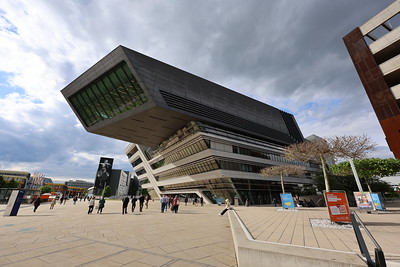
Exterior of the WU Library & Learning Center
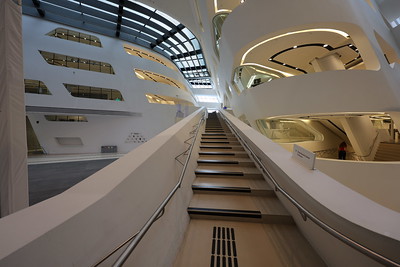
One of many interior staircases in WU Library & Learning Center
For context, this meeting is an opportunity for members of ABLD, Asia Pacific Business School Leaders Group (APBSLG), Group of Latin American Information Center Directors (CLADEA), and European Business School Leaders Group (EBSLG) to come together every three years or so – pre-COVID. The last joint-meeting actually took place in 2016 at Singapore Management University, so there was a big buzz around finally being able to gather in-person. Each group takes turns hosting, next time around this event is likely to be in the Americas somewhere. As a member of ABLD, I have yet to meet with the group in-person, but have many times over zoom, so it was not only a great time meeting many American business library leaders in person, but it was also fantastic to meet so many business librarians from around the world including countries such as Sweden, Singapore, Slovenia, Scotland, Norway, Ecuador, Germany, England, Canada, and more. There were about 65 attendees, 23 of which were from ABLD.
This conference started with a tour of the Library and Learning Center and then an opening reception. The tour was over two hours long, but turned out to be a great way to start chatting and networking with other librarians from around the world as we couldn’t help but discuss the architecture, use of spaces, collections, design choices, etc. The next day was when the real content started with a keynote from Andy Priestner on Letting go of Uncertainty. Andy was a former librarian at Cambridge, as well as former President of EBLG, and is now a consultant. Overall, his talk discussed why embracing uncertainty as an opportunity rather than a threat is beneficial for libraries and librarians. Priestner’s challenge to reframe uncertainty as an opportunity resonated deeply with me, especially as business librarians confront AI, shifting curricula, and new student expectations.
Later that day, I experienced what I think to be the most unique conference experience of my career thus far, by attending Lorenz Huber’s session titled, “Leadership Orchestra”. Huber is a conductor for an orchestra, and, as we sat mixed in with members of his orchestra, he continued to talk to us about leadership strategy from his context – yes, this entailed musical examples from his orchestra throughout. I gained new insights into the internal workings of orchestras; who leads and how in an expert team, and what is required from a leader as well as a ‘follower’ to make a cohesive moving part. Huber really focused on balanced leadership, which in his words avoids over and under-control to ensure interactive play on the part of his team. He humbly began the session by acknowledging a common question: is a conductor even necessary when the orchestra is made up of experts? This immediately prompted us to reflect on the role and value of leadership—particularly in environments, like libraries, where highly skilled professionals often operate with autonomy. I especially appreciated his insight that, in an orchestra, some musicians may be tasked with playing the more repetitive or understated parts—but their role is absolutely essential to the harmony and success of the performance. It made me think about how, in libraries, not every task is glamorous or visible, yet each one contributes critically to our collective impact and service mission. In the end, we even got to try our hand at conducting one of the orchestra members and we even were given our very own conductor baton to keep!
Pictures from Lorenz Huber’s orchestra session:
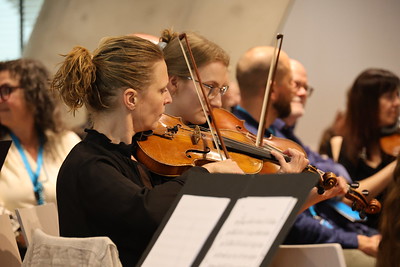
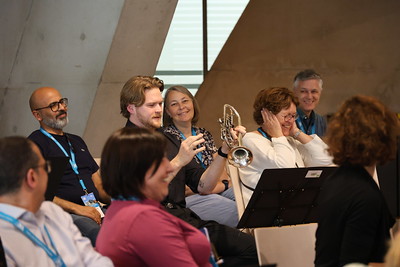
The next morning was followed by an intensive AI workshop, led by business WU faculty member, Martin Giesswein. In the AI workshop, we attempted to forecast potential scenarios for libraries in the year 2035, an exercise in embracing uncertainty and uncovering future opportunities utilizing the Lean Canvas methodology, a popular entrepreneurship tool that helps you plan and iterate your product or service. My group focused on how evolving student and user behaviors might shape library services in 2035. Our discussion ranged widely, but key themes emerged: students may interact with libraries through implanted technologies or digital avatars; demand for 24/7 service and expanded virtual support will likely grow; and libraries might play a critical role in verifying facts and truth for large tech platforms. It was a fascinating and imaginative exploration of what lies ahead [and let me tell you, other groups’ forecasts were much, much darker].
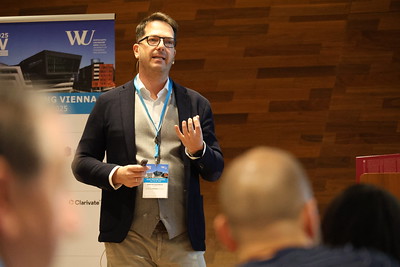
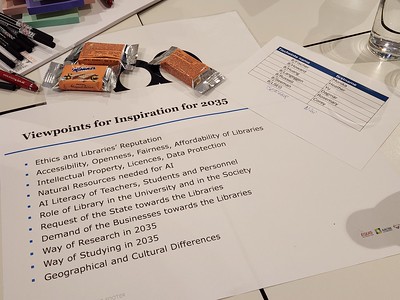
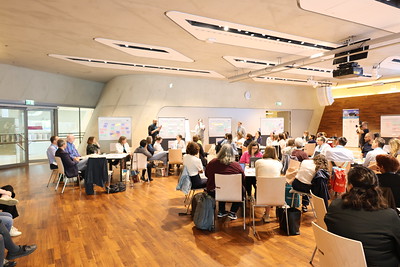
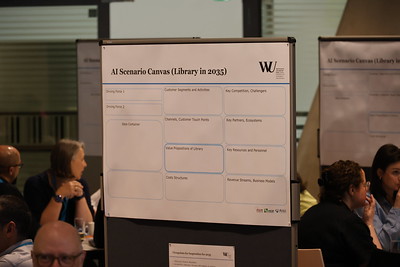
The AI workshop culminated in a group tour of the Austrian National Library, which was exquisite and definitely an inspiration for the library in Beauty and the Beast.

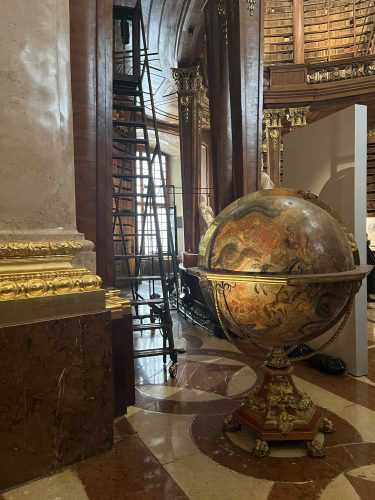
The last day of the conference, aside from business meetings, included the last round of invited presentations from attendees. I had the opportunity to present. My presentation explored how experiential learning, including a case study of my three study abroad course iterations, can serve as both a pedagogical tool and a strategy for embracing uncertainty. [View my slides here].
Overall, this meeting made me truly realize that though we are navigating through an uncertain, slightly scary time for higher education here in the USA, we are not alone. I learned that the UK is scaling back spending for higher education as well. Even Indian schools were not able to be represented at the joint-meeting due to budget constraints. After this experience, it was abundantly clear to me how much we can benefit from wider communication with all of our global colleagues and I hope efforts are sustained to continue regular communication amongst these groups until the next joint-meeting because the world will likely look very different the next time we are able to meet again.
Thank you ZSR for this great opportunity and thank you Corey Seeman, Director, Kresge Library Services, Stephen M. Ross School of Business, University of Michigan for almost all of the wonderful photos.

8 Comments on ‘Summer @ the ABLD Joint-Meeting in Vienna, Austria’
Thank you for sharing, Summer. This looks amazing! I must say that the idea of having members of an orchestra in the audience as a way of illustrating leadership approaches sounds awesome!
I am so glad you were able to attend this. That orchestra session sounds amazing!! A perfect example of interplay between the Humanities and other disciplines!
Thank you for sharing this write-up and accompanying photos, Summer. What an incredible opportunity from start to finish. I really appreciate your framing of librarians as leaders in experiential learning; it’s a powerful and timely perspective. And you’re absolutely right: Kolb’s framework is especially relevant in designing meaningful learning experiences in the age of AI!
What an amazing opportunity and experience! Thanks for sharing.
Thank you for this conference write-up and sharing your experiences! What an overall creative way to explore business libraries’ impact! (Is it just me or does the WU Library and Learning Center look a lot like the Hunt Library at NCSU?) I’m so glad your international learning experiences are paying off for you. Great work!
Fascinating post, thank you!
What an amazing learning experience, Summer! I’m really pleased that you had the opportunity to go to this conference and meet other members of this organization and other business librarians in person. I love the interactive session with the orchestra, and coincidentally, earlier in the day, Jemma and I had just talked about music ensembles as a metaphor for the essential role of each library worker. Thanks for sharing your experience and for taking great pics!
Wow, this sounds awesome! You packed in a lot and I loved the orchestra concept, and this really resonated with my role in tech services: “…some musicians may be tasked with playing the more repetitive or understated parts—but their role is absolutely essential to the harmony and success of the performance. It made me think about how, in libraries, not every task is glamorous or visible, yet each one contributes critically to our collective impact and service mission.” I found your slides from your presentation to be inspiring. I also just looked up Lean Canvas and now I’m wondering what our patrons top 3 problems are? Maybe Libanswers can give us some insights.